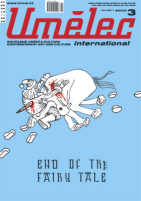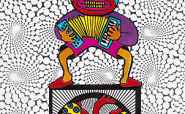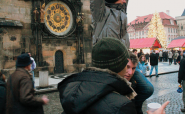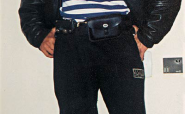| Zeitschrift Umělec 2003/3 >> Ad: PERFECT TENSE | Übersicht aller Ausgaben | ||||||||||||
|
|||||||||||||
Ad: PERFECT TENSEZeitschrift Umělec 2003/301.03.2003 Jan Šerých | info | en cs |
|||||||||||||
|
Perfect Tense – Painting Today, Prague Castle Riding School, 19. 11 2003 – 14. 3. 2004
Jan Šerých I know that it‘s not totally in order to criticize an exhibition which (at this moment) exists only in the minds of the curators and in media ads. But allow my purely subjective outburst to be understood as a premature release of steam. From the leaflet announcing the exhibition, I learned for the first time about the concept for a magnanimous enterprise called Perfect Tense — malba dnes (Painting Today), and, especially, the final composition of exhibiting artists, among whom I was named. Such a bizarre misalliance I have never experienced, not even in the regular exhibitions of the Academy. Everything in the service of the unhappy painting: "The motto of the day is the spiritual painting, physically beautiful, satisfying the eye as well as the soul. It is readable in the first and in the second plane, understandable to the layman and the professional, but with a certain level of revaluation, ironization, the paraphrase appears as a condition sine qua non. Painting in 2003 is a painting after a painting, returning to the classical form, but with the ‘alien’ of new media visuality safely nested within its guts." I really don’t have a clue what kind of alien might be nesting in Dita Štěpánová’s (Roman Franta’s... etc.) guts, but I know very well this is not my thing. Mutual transfusion excluded. Sorry. This must be written. I know the twenty-four co-exhibiting artists (except for one honorable exception); I respect most of them, but I would happily swap a good half of them. With respect to the above-mentioned statement (which I agree with)and how this incomprehensible idea was actually brought to fruition, it may be more realistic to think about how I would re-cast it. In short, I was recently addressed by the curators; I didn’t ask too much and gladly agreed. Now I state: If I had known this then, I would never have gone there! Jan Šerých (8. 12. 2003) P.S.: The exhibition starts two weeks from this day (Dec. 5, 2003); if I am mistaken and everything turns out differently, I will be happy to make a flowery apology. Curators of the exhibition: Olga Malá, Karel Srp Jiří Černický, Filip Černý, Zdeněk Daněk, Roman Franta, Daniel Hanzlík, Aleš Havlíček, Aleš Hudeček, Eliška Jakubíčková, Filip Kudrnáč, Martin Kuriš, KW, Petr Malina, Michal Nesázal, Jiří Petrbok, Milan Salák, Vít Soukup, Katarína Szanyiová, Jan Šerých, Pavel Šmíd, Jakub Špaňhel, Kateřina Štenclová, Dita Štěpánová, Roman Trabura, Lubomír Typlt, Jaroslav Valečka
01.03.2003
Empfohlene Artikel
|
|||||||||||||





Kommentar
Der Artikel ist bisher nicht kommentiert wordenNeuen Kommentar einfügen